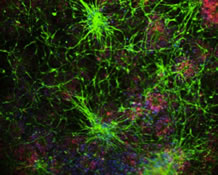Columbia University
Irving Medical Center
Neurological Institute
710 West 168th Street, 3rd floor
(212) 305-1818
Featured Research
In the Lab:
Sandra Barral, PhD
 Sandra Barral, PhD
Sandra Barral, PhDThe primary aim of my research is to investigate the role of genetic variation in cognitive performance in both normal aging and diseases of aging such as Alzheimer's Disease (AD).
Among my ongoing studies is a project to elucidate the genetic basis of episodic memory function in cognitively healthy elderly, as part of the Alzheimer's Disease Research Center (ADRC) at Columbia University. Previous research to investigate changes in the aging human dentate gyrus (DG) associated with age-related memory loss identified several candidate genes whose DG expression was substantially related to age changes. The gene showing the strongest association (RbAp48) in the DG of aged mice was accompanied by improved memory performance. RbAp48 plays multiples roles in histone acetylation, transcriptional regulation, and the cyclic adenosine monophosphate (cAMP)–protein kinase A (PKA)–cAMP response element–binding protein 1 (CREB1) pathway required for normal hippocampal function and aging. We previously showed that genetic variants in different CREB1 pathway genes (RbAp48, CREB1 and CREBBP) were associated with episodic memory function in cognitively healthy elderly. The current ADRC project will explore the association between episodic memory function and candidate genes differentially expressed in the dentate gyrus or acting in the CREB1 pathway. The identification of genetic variants underlying memory function in cognitively healthy individuals may pinpoint mechanisms for preventing or delaying cognitive decline that might be distinct from those identified by studies of subjects with cognitive impairment or dementia.
Another ongoing study is a collaboration with Taub colleague Dr. Badri Vardarajan, with funding support from the Department of Defense. This project aims to investigate the possible association between traumatic brain injury (TBI) and increased susceptibility to Late Onset Alzheimer’s Disease (LOAD). Although there are some contradictory findings regarding whether patients with LOAD had a significantly greater incidence or history of TBI, most studies point to a high likelihood that TBI influences the aging process, producing adverse clinical consequences, such as permanent neurological deficits. In this context, genetic variation has been investigated as a potential modulator of the development of LOAD after TBI. We aim to explore the interaction of genetic risk factors with TBI in predicting the risk of LOAD, using a longitudinal cohort of more than 4,000 samples to characterize the memory trajectories in samples from four different groups: subjects with both LOAD and TBI, subjects with LOAD but not TBI, subjects with TBI but not LOAD, and subjects without LOAD and TBI. Our hypothesis is that subjects that have LOAD and were exposed to TBI will show rapidly declining memory measures, while healthy controls without LOAD or TBI will have flat, plateau-like memory performance in the same period of time. Subsequently, we will then conduct genome-wide testing on the interaction of all genes with TBI in predicting risk of LOAD.
In collaboration with Dr. Richard Mayeux and the Laboratory for Genetic Epidemiology, I am also part of projects using the Washington Heights-Inwood Columbia Aging Project (WHICAP) cohort and the Estudio Familiar de Influencia Genetica en Alzheimer (EFIGA) family-based cohort of Caribbean Hispanics in the Dominican Republic, Puerto Rico, and New York City. I am also a team member of the National Institute on Aging Genetics Initiative for Late-Onset Alzheimer Disease (NIA-LOAD) study, the Long Life Family Study (LLFS), the Alzheimer's Disease Genetics Consortium (ADGC), and the Alzheimer’s Disease Sequencing Project (ADSP).
Sandra Barral, PhD
Assistant Professor of Neurogenetics (in Neurology, the Taub Institute and the Gertrude H. Sergievsky Center) at the Columbia University Medical Center
smb2174@cumc.columbia.edu

